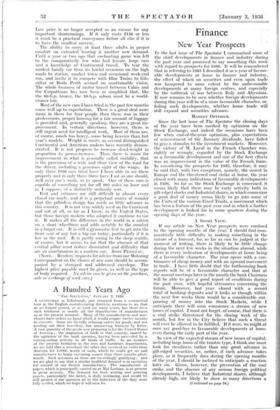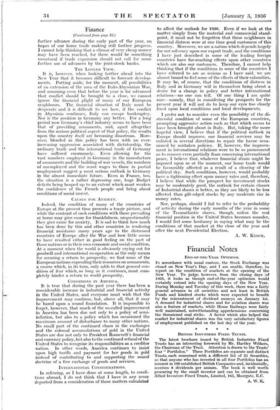New Year Prospects
Finance
IN the last issue of The Spectator I summarised some of the chief developments in finance and industry during the past year and promised-to say something this week with regard to prospects for 1936. It will be remembered that in referring to 1935 I described it as a Year Of favour- able developments at home in finance and industry, the effect of which' on securities and even "upon trade was hampered to some extent by the unfavourable developments at many foreign centres, and especially by the outbreak of war between Italy and Abyssinia. It now remains to be seen whether foreign developments during this year will be of a more favourable character, or, failing such developments, whether home trade will still expand and securities advance. -
MARKET OPTIMISM. .
Since the last issue of The Spectator the closing days of the year have been marked by optimism on the Stock Exchange, and indeed the occasions have been few when end-of-the-year optimism, plus expectations of reinvestment of the January dividends, have failed to give a stimulus to the investment markets. Moreover, the victory of M. Laval in the French Chamber was, rightly or wrongly, regarded by the Stock Exchange as a favourable development and one of the first effects was an improvement in the value of the French franc. In considering the prospects for 1935, therefore, it may be said that, with two exceptions, namely, the unrest in Europe and the threatened coal strike at home, the year closed with many indications of favourable developments in 1936. So far as the Stock Exchange is concerned, it seems likely that there may be early activity both in gilt-edged stocks and Industrial shares, in which connexion a good deal of money seems likely to go into some of the Units of the various Fixed Trusts, a movement which has been a feature of the past year and in which a further development is looked for in some quarters during the opening days of the year.
A SHORT VIEW.
If my article on New Year prospects were confined to the opening months of the year, I should find com- paratively little difficulty, in making something in the nature of a forecast, for, so far as can be judged at the moment of writing, there is likely to be little change during the next few weeks in the situation abroad, while there is every indication of developments at home being of a favourable character. The year opens with a con- tinuance of cheap money and with an upward movement in trade. I have little doubt that the forthcoming bank reports will be of a favourable character and that at the annual meetings later in the month the bank Chairnien will be able to give a good report of conditions during the past year, with hopeful utterances concerning the future. -Moreover, last year closed with• a record total of banking deposits and it looks as though within the next few weeks there would be a considerable out- pouring of money into the Stock Markets, while I anticipate there will soon commence a stream of new issues of capital. I must not forget, of course, that there is a coal strike threatened for• the closing week of the month, but few in the City believe that such a threat will ever be allowed to be fulfilled. If it were, we might a once say good-bye'-to favourable developthents at home even during the early part of the year.
In view of the expected• stream of new issues of capital, including large loans of the trustee type, I think one must look for steadiness rather than any great advance in gilt-edged securities, or, rather, if such advance takes place, as it frequently does during the opening months of the year, I should be inclined to anticipate a reaction later on. given, however, the prevention of the coal strike and the' absence- of any serious foreign political developments, I believe that Industrial shares; although already high, are likely to show in many directions a (Continued on page 3t) . ' Finance (Continued from page 32.) further advance during the early part of the year, on hopes of our home trade making still further progress. I cannot help thinking that a climax of very cheap money may have been reached, for there would be something unnatural if trade expansion should not call for some further use of advances by the joint-stock banks.
THE LONGER VIEW.
It is, however, when looking farther ahead into the New Year that it becomes difficult to forecast develop- ments. Putting aside, for the moment, all possibilities of an extension of the area of the Italo-Abyssinian War, and assuming even that before the year is far advanced that conflict should be brought to a close, we cannot ignore the financial plight of many of our European neighbours. The financial situation of Italy must be desperate and it is difficult to see how, if the conflict in Abyssinia continues, Italy can escape bankruptcy. Nor is the position in Germany any better. For a long period now Germany's chief industry seems to have been that of providing armaments, and, apart altogether from the serious political aspect of that policy, the results upon the country itself are becoming- disastrous. More- over, blended as this policy has been with an ever- increasing oppression associated with dictatorship, the ordinary trade and the international trade of Germany have suffered enormously. Even allowing for the vast numbers employed in Germany in the manufacture of armaments and the building of war vessels, the numbers of unemployed and the scant wages to those in partial employment suggest a most serious outlook in Germany in the almost immediate future. Even in France, too, the situation is a rather depressing one, huge Budget deficits being heaped up to an extent which must weaken the confidence of the French people and bring about conditions of social unrest.
CAUSES FOR ANXIETY.
Indeed, the condition of many of the countries of Europe at the present time presents a tragic picture, and while the contrast of such conditions with those prevailing at home may give cause for thankfulness, unquestionably they give cause for anxiety. It is sad to think how much has been done by this and other countries in rendering financial assistance many years ago to the distressed countries of Europe after the War and how little seems to have resulted either in good feeling on the part of those nations or in their own economic and social condition. At a moment when the world is obviously crying out for goodwill and international co-operation as the only means for securing a return to prosperity, we find some of the European nations expending their resources on armaments, a course which, in its turn, only adds to that general con- dition of fear which, so long as it continues, must com- pletely hinder a return to world prosperity.
CONDITIONS IN AMERICA.
It is true that during the past year there has been a considerable increase in industrial and financial activity in the United States, and everyone must wish that the improvement may continue, but, above all, that it may be based upon a sound foundation. It is impossible to forget, however, that much of the so-called improvement in America has been due not only to a policy of semi- inflation, but also to a policy which has occasioned the maximum amount of disturbance to many other nations. No small part of the continued chaos in the exchanges and the colossal accumulations of gold in the United States are due not only to President Roosevelt's financial and currency policy, but also to the continued refusal of the United States to recognise its responsibilities as a creditor nation. In other words, America continues to insist upon high tariffs and payment for her goods in gold instead of contributing to and supporting the sound doctrine of a free exchange of goods and services.
INTERNATIONAL CONSIDERATIONS.
In referring, as I have done at some length, to condi- tions abroad, I do not think that I have in any sense departed from a consideration of those matters calculated to affect the outlook for 1936. Even if we look at the matter simply from the .material. and canuneraial- stand- point, it must not be forgotten that these neighbours in financial distress were at one time good customers of this country. Moreover, we are a nation which depends largely for our solvency upon our export trade, and the conditions I have just described in some of the leading foreign countries have far-reaching effects upon other countries which are also our customers. Therefore, I cannot help thinking that if the conditions in some of the countries I have referred to are as serious as I have said, we are almost bound to feel some of the effects of their calamities. It may be, of course, that the conditions of distress in Italy and in Germany will in themselves bring about a desire for a change in policy and better international relations—no one can tell. Of one thing I am quite sure—namely, that in considering the prospects for the present year it will not do to keep our eyes too closely fixed upon local conditions and local developments.
I prefer not to consider even the possibility of the di- stressful condition of some of the European countries, prompting aggressive action such as that which seems to have been brought about in Italy. But, taking the more hopeful view, I believe that if the political outlook in Europe should improve, our financial services may be enlisted in several directions to repair the havoc occa- sioned by mistaken policies. If, however, the improve- ment in international relations were to be so pronounced as to remove even partially fears concerning international peace, I believe that, whatever financial strain might be imposed upon us at the moment, our home trade would be favourably affected as a result of a clearing of the political sky. Such conditions, however, would probably have a tightening effect upon money rates and, therefore, I believe that while the prospect for investment stock; may be moderately good, the outlook for certain classes of Industrial shares is better, as they are likely to be less affected than gilt-edged stocks by any moderate rise in money rates.
Nor, perhaps, should I fail to refer to the probability of activity during the early months of the year in some. of the Transatlantic shares, though, unless the real financial position in the United States becomes sounder, I would feel some hesitancy in saying what may be the conditions of that market at the close of the year and after the next Presidential Election.
A. W. KIDDY.











































 Previous page
Previous page